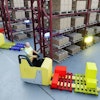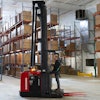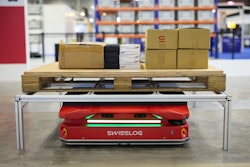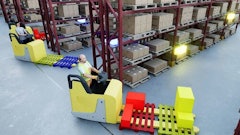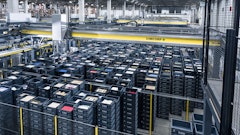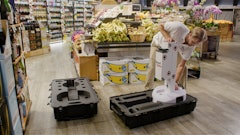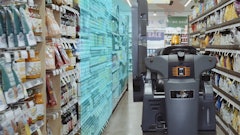
As U.S. trade policy takes a more aggressive turn, food and beverage manufacturers are bracing for new cost pressures and supply chain volatility. The recent announcement of additional tariffs on a number of smaller nations, including key agricultural exports in Africa and the Caribbean, is the latest disruption in what feels like a long cycle of geopolitical uncertainty and logistical strain. With production costs rising and sourcing reliability in question, food manufacturers are being forced to rethink operations.
Today's supply chain must be adaptable, resilient, and safe in addition to the traditional sole focus on efficiency. As a result, many companies are accelerating their investments in automation to help navigate this high-stakes moment. Among the most transformative of solutions is the automated storage and retrieval system (AS/RS).
Trade tensions and tariffs can ripple through supply chains in unpredictable ways causing ingredient shortages, shipping delays, and cost spikes. By implementing an AS/RS, manufacturers gain the control and flexibility needed to respond quickly to changes in inventory availability, supplier reliability, and consumer demand.
Automation reduces dependency on manual labor and volatile global sourcing schedules, AS/RS platforms help manufacturers stay compliant, maintain product integrity, and respond dynamically to changes without sacrificing safety or sustainability.
Key ways AS/RS supports food manufacturers
- Minimized contamination risk with labor gaps
With tighter budgets and workforce uncertainty, especially in import-heavy segments, many manufacturers face labor shortages that can compromise quality and safety. An AS/RS reduces physical touchpoints, helping maintain high hygiene standards even with fewer human handlers, and lowering the risk of pathogen or allergen contamination.
2. Inventory visibility for smarter decision making
Tariff-induced cost changes often require shifts in procurement or batch prioritization. AS/RSs integrated with warehouse management platforms provide real-time tracking, allowing companies to reallocate stock, manage recalls, and rotate inventory based on origin, expiration date, or lot. This kind of agility is critical when product availability or costs shift quickly due to trade policy.
3. Environmental control and waste reduction
Imported perishables often face longer or unpredictable transit times under new tariff regimes. An AS/RS helps mitigate spoilage risks through tightly regulated temperature and humidity controls. These systems ensure that goods, especially high-risk categories like dairy, produce, and seafood remain within safe parameters while minimizing waste and energy usage.
4. Compliance and certification readiness
The environment is still heavily regulated, where every shipment's origin, storage condition, and traceability must be documented, and automation enables compliance at scale. An AS/RS provides automated logs and environmental records, ensuring seamless audits and adherence to global food safety standards, even as tariffs and sourcing rules shift.
5. Precision and product segregation
With some ingredients now more expensive due to tariffs, product integrity matters more than ever. An AS/RS enables precise separation of allergen containing items, organic and non-organic SKUs, or temperature-sensitive ingredients. That ensures compliance with labeling regulations and avoids expensive recalls or certification issues.
A role for AI in weathering uncertainty
AS/RSs incorporate AI and machine learning to further bolster resilience. Predictive analytics tools can assess demand fluctuations tied to trade developments, optimize inventory levels, and prioritize shelf-life sensitive items. AI-driven route planning for AGVs and AMRs also improves warehouse throughput, helping operations stay productive even when margins are squeezed.
What once may have been considered a "nice-to-have" investment is now a strategic imperative. As the food and beverage sector faces geopolitical shocks, rising logistics costs, and tougher consumer and regulatory scrutiny, automation is becoming the backbone of operational strategy. Automation helps manufacturers work through today's challenges while also preparing for future unknowns thanks to a reduction in waste, improved traceability, and increased speed and flexibility. In a food supply chain increasingly defined by instability, smarter storage may be the surest path to safety, sustainability, and success.

